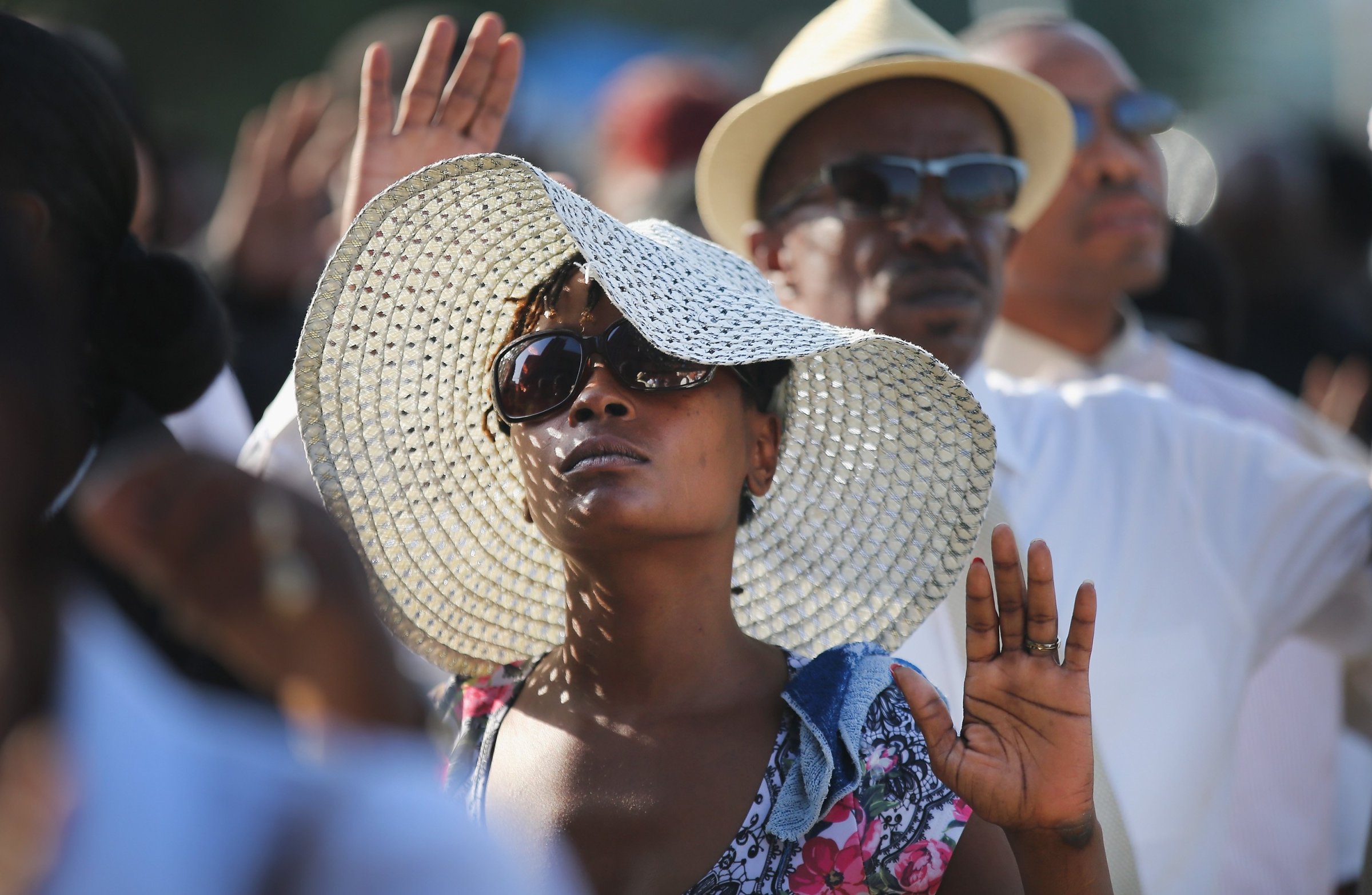
Monday’s funeral mourning the death and celebrating the life of Michael Brown represents a profound chance for the Ferguson community and the nation at large to begin the healing process and to move forward from the horrific events surrounding the August 11th killing of the unarmed teenager. The role of faith in this national healing process is crucial. Our legal processes and political solutions can give some answers and provide some solace, but these alone cannot heal our people and allow our nation to move forward.
Faith teaches us how important it is to encounter the suffering of others. In the Bible, the first two questions that God addresses to humanity are: “where are you?” and “where is your brother?” Today God asks the same of us. We must seek out and find our brothers and sisters in Ferguson. Though we can never completely grasp it, we must encounter their suffering. We must listen to their stories. And we must try to share in their pain. Pope Francis says this “culture of encounter” will even give us the ability to weep with those who suffer.
Though some will want to move immediately into political, policy or even moral solutions, this approach is wrongheaded. No law, no government program and no sermon will alone end the violence and bring complete healing to Ferguson and to the nation. So we must resist the temptation to thrust ourselves into these situations and declare ourselves the messiahs with the answers. Rather, we must be companions for the long journey towards healing. The era of the “voice for the voiceless” is over. Everyone has a voice, and we must encounter it.
During his ministry, Jesus of Nazareth encountered many people begging for healing. While in Jericho, two blind men called out to him asking for mercy and for the gift of sight. Though the crowd tried to silence them, the men didn’t waver and cried out, “Lord, open our eyes!” Scripture tells us that Jesus was then moved with compassion for them and gave them their sight.
What truth do we discover in Ferguson when we encounter the suffering there and our own blind spots are removed?
We first see that the outward violence that has plagued Ferguson since Brown’s killing didn’t begin on the streets that afternoon. Rather, it’s the fruit of the invisible violence that plagues our communities everyday. It’s the violence of institutions that fail to serve its people. It’s the violence that afflicts the poor and makes us indifferent to others’ suffering. It’s the violence of inaction in the face of failing schools, decaying cities and economic disparities. It’s the violence that sows distrust between people and communities because the color of their skin. This violence isn’t as evident as the gunshot that killed Michael Brown, but it’s just as deadly.
Nearly six years after the election of Barack Obama, we must acknowledge that racism is still very much alive in our nation and even in our churches. In fact, when we end the carnival of naiveté around this issue and remove the masks, we will see the truth: individual and structural racism is tearing at the very fabric of our nation. It’s cloaked in seemingly different and even benign issues such as tax codes, school zonings and the allocation of federal resources.
We too experience this racism in our own lives and in our own hearts—even in perhaps the smallest of ways. No one is truly beyond it. It’s a broken part of us that is twisted up in our own lives, our own histories and our own failings. But when we acknowledge its presence in our own lives and in our communities, we can join with the Psalmist and cry out: “forgive us, Lord, for we have sinned!”
This first step of encounter and acknowledgment can begin the journey of reconciliation for our communities and our nation. Desmond Tutu said it well: “true reconciliation exposes the awfulness, the abuse, the hurt, the truth. …It is a risky undertaking but in the end it is worthwhile, because in the end only an honest confrontation with reality can bring real healing.”
Today, we must be those men of Jericho. We must cry out and ask God to remove the masks that blind us. The road of encountering human suffering and the invisible and institutional violence that precedes it is uncomfortable, but it isn’t sterile. It will allow us to see the grittiness of the truth and to experience the gift of reconciliation and healing that will bind the wounds that divide us and allow us to move forward as a nation.
Christopher Hale is a senior fellow at Catholics in Alliance for the Common Good. He helped lead national Catholic outreach for President Obama’s re-election campaign. You can follow him on Twitter @chrisjollyhale.
More Must-Reads from TIME
- Donald Trump Is TIME's 2024 Person of the Year
- Why We Chose Trump as Person of the Year
- Is Intermittent Fasting Good or Bad for You?
- The 100 Must-Read Books of 2024
- The 20 Best Christmas TV Episodes
- Column: If Optimism Feels Ridiculous Now, Try Hope
- The Future of Climate Action Is Trade Policy
- Merle Bombardieri Is Helping People Make the Baby Decision
Contact us at letters@time.com